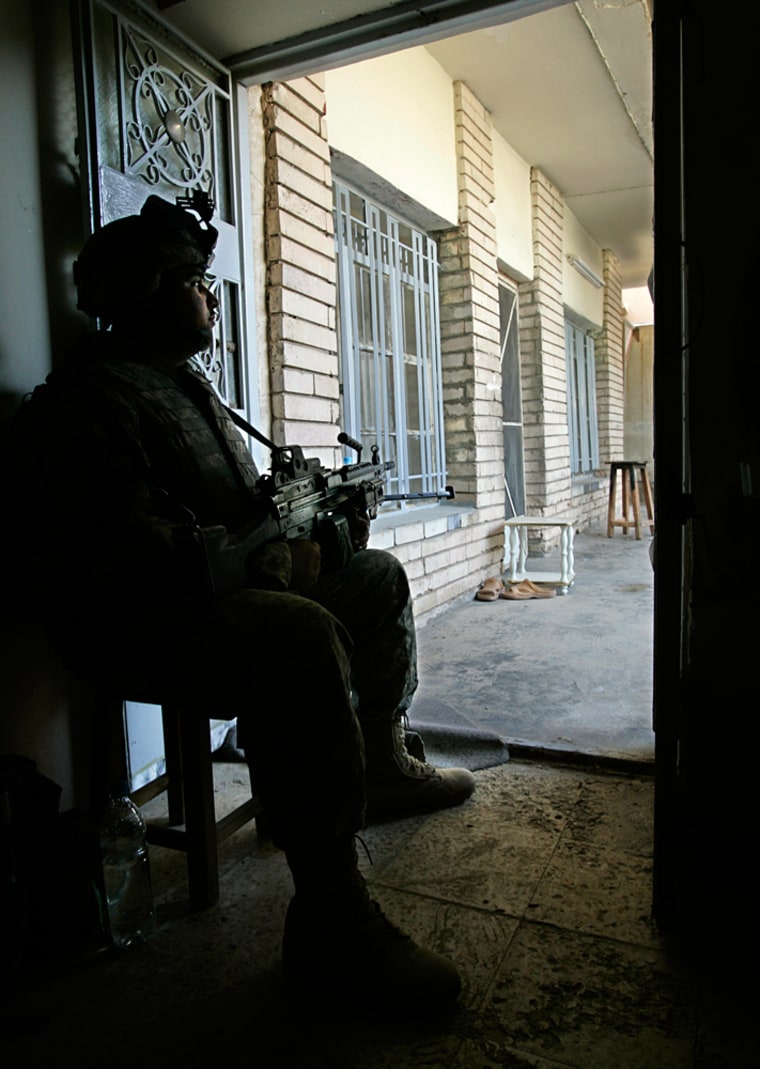Helicopters flew over the Iraqi town of Ramadi and warplanes could be heard overhead as hundreds of U.S. and Iraqi troops pushed into an eastern section of one of Iraq’s most violent cities early Monday, the latest step in a campaign to bolster their presence in neighborhoods largely under insurgent control.
Seven tanks moved along Masarif Street and July 17 Street, a Reuters witness said. Two explosions were heard but the cause was not clear.
Soldiers also scoured through dozens of homes in the area, finding several weapons caches and equipment used to construct roadside bombs.
During a similar operation on Sunday, U.S. troops erected two outposts in the southern half of the city to allow Iraqi soldiers to begin patrolling an area that has rarely seen any U.S. or Iraqi forces.
The operation was launched to establish a new outpost in the eastern Mulaab neighborhood of the city that would allow U.S. and Iraqi troops to better patrol a troublesome area where insurgents have frequently attacked. The outpost would be less than a mile deeper into the city from their current base.
“It’s one of the first steps to moving into areas of the city that have not had a large coalition or Iraqi presence for a long time, if ever,” said Col. Sean MacFarland, commander of the 1st Brigade, 1st Armored Division that oversees the city.
Residents fearful
Shops were shuttered and most residents stayed home, fearing a U.S. offensive on the scale of the one that inflicted heavy destruction and loss of life in nearby Fallujah in 2004.
The U.S. military has played down talk of that type of campaign, saying the buildup was part of efforts to restore stability in Ramadi, 110 miles west of Baghdad.
Residents say U.S. troops have not urged people to leave the town, the capital of Anbar province, heartland of the Sunni Arab insurgency seeking to topple the Shiite-led government.
U.S. and Iraqi forces are setting up additional checkpoints and focusing on depriving rebels of positions used to launch attacks in the city, the military said.
New Prime Minister Nuri al-Maliki has said he would try to restore stability in Ramadi through dialogue with tribal and community leaders and that force of the type used in Falluja would only be a last resort.
But the people of Ramadi fear the worst.
“I can’t open my shop. Everybody expects the Americans to invade the city. I already took most of the materials in my shop and hid them in my house because the Americans could shoot or burn my shop,” said grocery shop owner Faisal Ghazi, 50.
'No water for 24 hours'
Ramadi has emerged as the biggest hotspot in Iraq after a major U.S. military offensive crushed al-Qaida militants and insurgents in Fallujah, a former rebel bastion.
Several parts of Fallujah were destroyed by artillery, tank and aerial bombardment.
Earlier in June, U.S. military said al-Qaida had gained ground in Ramadi and that 1,500 extra U.S. troops brought to Iraq would be used to try to break its grip on the town.
Some families began leaving Ramadi weeks ago in anticipation of an offensive. Others who stayed behind say they are suffering from electricity and water shortages.
“The water is totally cut off. We have to go to the river to get water. There has been no water for 24 hours and we have no gas to boil the river water to drink it,” said Ali Hussein Mohammed, 45.
